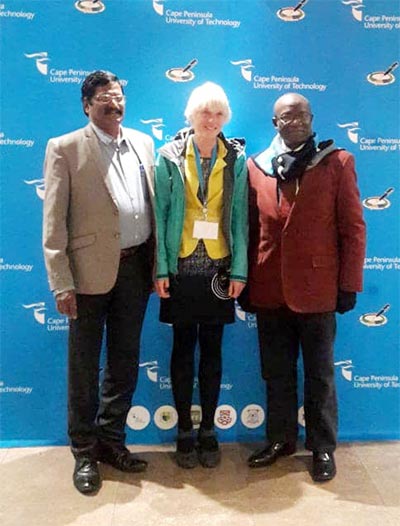The Vice-Chancellor of Olabisi Onabanjo University, Professor Ganiyu Olatunji Olatunde, recently delivered a keynote address at the U6 International Conference at held at the Cape Peninsula University of Technology, Cape Town, South Africa with two other speakers from the United States of America and Asia. The International Conference, which was held between 4 – 6 September, 2018 had scientists and academics from all over the world in attendance.

In his address, titled “Research, Innovation and Technology for Africa Development: Challenges faced by African Universities”, the Vice-Chancellor, identified Universities as engines of growth and development whose obligations are to impact their stakeholders, the immediate environment, nations and regions, the global community and indeed humanity and the terrestrial ecosystem through the use of Research, Innovation and Technology. The Vice-Chancellor posited that while Universities in other parts of the world have utilized Research, Innovation and Technology to develop their regions and continents, Universities in Africa have lagged behind in impacting significantly on the developmental strides of the continent due to a number of factors. He highlighted factors militating against the African Universities to the development of the continent to include: inadequate funding, low and ineffective linkages and collaborations, low level of experienced academics in the governance and human resource base of many of the Universities, poor policy formulation and execution by governments, poor research focus and inadequate expenditure for research and development, low utilization of the potential benefits of their Alumni Associations as well as the contributions of other stakeholders, and inefficient/weak University-Industry-Government linkage. Speaking further, he listed the contributions of Universities all over the world to development to include among others, production of highly skilled graduates, economic development of the immediate environment, creation of new businesses and industries and contribution to the GDP of their countries of location. Professor Olatunde suggested that the impact of African Universities to the development of the continent can be very significant if the various governments in Africa can increase subventions to their Universities, tailor policy formulation and execution to address the challenges facing the Universities, ensure a stable economy that will provide the private sector with the enabling environment to absorb inventions arising from university researches and lessening interference in the running of the Universities. On the part of African Universities, Professor Olatunde suggested that they should develop research goals and focus that can drive strong local and international collaborations, and engender the exchange of ideas and opinions among them and between them and universities in advanced economies, promote merit and experience in their recruitment processes, tailor their research work towards generating innovative and problem-solving research, and re-direct their focus and mandate into turning their research discoveries into valuable inventions.
Furthermore, African Universities should harness the contributions of their alumni associations and development partners to increase their funding base, embrace entrepreneurship and continuously modernizing their curricula to align with the needs of stakeholders and to solve emerging challenges and develop nexus with the industrial sector and other stakeholders to fund their research and engender exchange of ideas between the academia and the corporate world.
In ending the speech, Professor Olatunde solicited for more funding support and grants from International Organization like the World Bank, African Development Bank, European Union, etc. for African Universities to build capacities in Research, Science and Technology and engender improvement in the quality of life of the people and societal advancement in African, building capacities in Research, Science and Technology to engender improvement in quality of life of the people and societal advancement in Africa.
On the entourage of the Vice-Chancellor was the Deputy Vice-Chancellor, Academic of the University, Professor Deji Agboola, who seized the opportunity of the Conference to explore possible linkages with the representatives of the universities that were present.

